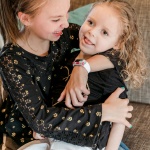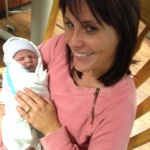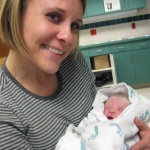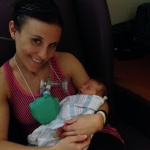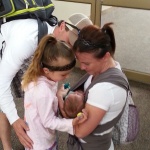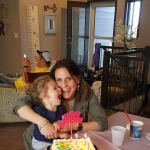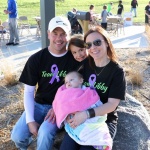by Jody Kerzman | Photography: Photos by Jacy
Like many couples, Mike and Kari Wolff’s road to adoption began with infertility.
“We were to the point where we were going to try in vitro,” recalls Kari. “But it just didn’t feel right. For whatever reason, it just didn’t feel like how we were supposed to have kids. We had that dream of having our own biological kids, but we had also always kind of thought about adoption.”
CHOOSING ADOPTION
The Wolffs chose adoption and their experience was, in Kari’s words, crazy.
“It was an unusually fast, easy process for us. We started the paperwork in August 2008, and by November we were matched with Layken. She was born in January and was ours the second she was born,” Kari says. “Most people wait a long time, sometimes years, to adopt. We just got really, really lucky with Layken. Everything went so smoothly. Our caseworker even said it’s not usually like this, it never happens this way.”
Kari even met Layken’s birth mom before she gave birth, went to a doctor’s appointment with her, and heard Layken’s heartbeat.
“I felt like I didn’t miss out on those first time mom experiences. I was even in the delivery room for the birth.”
From that moment, Mike and Kari became Layken’s parents. Layken, now nine, has always known she’s adopted.
“We’ve always been open with her,” says Kari. “We don’t have a relationship with her birth mom, but one day if she or Layken want one, we will be open to that.”
After settling into their life as a family of three, the Wolffs decided to adopt again. In 2013, they were matched with an expectant mom from Michigan. The day before Mike and Kari were to fly out for their son’s birth, the adoption fell through.
“So there’s the heartache. I had none of that the first time,” says Kari. “We were very, very heartbroken. I’ve talked to some friends who have had miscarriages; they say that feeling I had was similar to what a mom goes through when she has a miscarriage.”
The couple decided to wait before pursuing another adoption. They were building a new house, selling their old house, and didn’t want to have the stress of another failed adoption. But just a few short months later, there was another baby. A young expectant mom in Alabama chose them to be her baby’s parents. The baby was due in less than a month.
BRINGING HOME LIBBY
“We felt good about it. We had quite a bit of information about the birth mom. She was pretty open and said she had not had any prenatal care,” recalls Kari. “By the time she picked us, our paperwork had expired so we had to do all of that again super fast. We got it done in time and flew to Alabama in time for Libby’s birth.”
This time, Kari wasn’t in the delivery room, but the bond was just as instant. Libby was six pounds, eight ounces and despite some breathing issues, seemed healthy. She was transferred to the NICU in Birmingham because the hospital where she was born didn’t have a NICU. Still, Kari explains, it wasn’t a big deal.
“They told us the breathing issues could have been caused by many things, especially with the lack of prenatal care. We thought maybe she was born early.”
Two weeks into her three week stay in the Birmingham NICU, Libby’s heart rate skyrocketed to a dangerous level. Doctors gave her two doses of a drug that Kari explains basically stopped her heart and then restarted it. Finally, three weeks after she was born, Libby was released from the hospital. The family saw a pediatrician before heading back to North Dakota.
“I remember that doctor said Libby’s head seemed a little small. He didn’t think it was anything to be alarmed about, but recommended we follow up with our pediatrician when we got home,” remembers Kari. “It wasn’t a big deal. To us, she was just a little peanut that completed our family.”
UNEXPECTED NEWS
In July, the family followed up with a visit to Libby’s pediatrician in Bismarck. She confirmed her head was smaller and ordered a CT scan. That scan showed some abnormal formations on Libby’s brain. An MRI gave a better picture and led to Libby’s diagnosis of schizencephaly, a rare brain malformation.
“Basically, she suffered a stroke intrauterine, and at that point, her brain stopped developing. It actually affected both sides of Libby’s brain. She is also missing her corpus callosum, the center of the brain that connects the right and the left, and that’s how you get your coordination, communication. With this comes cerebral palsy, as well as high risk for seizures and epilepsy. She started having seizures at age two, and the CP is pretty dominant in all four extremities.
“At first I was angry,” admits Kari. “But then I was given some really good advice—let her be the child that she is, and love Libby for who she is. From that point on, I realized she didn’t deserve for me to be angry. None of this was her fault. So since then, we have embraced it and all the challenges.”
CHALLENGES AND EDUCATION
The challenges are plenty—Libby has seizures, gets sick easily, is nonverbal, and gets all her nutrition from a feeding tube. Challenges Kari tackles head on every day.
“I sometimes find myself falling back into anger, but I don’t stay there long, because I just can’t. I need to be strong. I need to educate myself as much as I possibly can to give her the best life that she deserves.”
That’s meant educating herself and learning things outside her comfort zone.
“I’m an accountant!” Kari laughs. “But I have learned a lot. I know it’s not the best form of education, but I’ve turned to Google a lot. It’s led us to doctors and different information.”
Kari has also learned to recognize seizures and pinpoint which part of the brain could cause them. She makes sure Libby attends physical therapy, occupational therapy, and speech therapy twice a week. Kari has gone to care coordination classes, served on the national schizencephaly awareness board, planned a national convention, and organized a local schizencephaly awareness day.
“We did our first awareness day on May 19, 2015, just three days before Libby’s first birthday. We’ve done it every year since,” says Kari. “We’ve had as many as 500 people at the event, which is great because it is a rare diagnosis, and not a lot of people know about it.”
Kari has connected with people across North Dakota who do know about schizencephaly and are living with it.
“It’s just brought so many great people to our lives.”
Just as adoption brought Kari’s daughters into her life.
FOR A REASON
“I wouldn’t change anything for the world. I look at it as Libby doesn’t have the perfect life that we thought she would, but there’s never a guarantee our children will be perfect. If I would have carried a child and the same thing would have happened, I will still need to charge forward and figure things out, just how I am now,” explains Kari. “That was my thought process going into the whole adoption process; when you do the paperwork, you can pick what you want, including a limb deformity, birthmarks, things you can’t pick if you give birth to a baby.”
And as it turns out, Layken and Libby were exactly what Kari and Mike needed. Their girls are their everything; Kari eyes fill with tears, the pride evident in her voice when she talks about her daughters.
“I felt connected to them the second they were born,” she says. “Layken is an amazing sister and advocate for Libby. Last year her class did an amazing playground project to make their school’s playground accessible for everyone. She helped inspire that. But it’s hard to be the sibling of a child with special needs. So much attention is always on Libby.”
But Kari knows there is a reason Libby came to their family. Perhaps it was to educate others about schizencephaly, to raise awareness about the disorder, or about adoption.
“Adoption is what makes us a family,” Kari says matter-of-factly.
A family that will stick together, no matter what life throws at them.
Click here to see more photos by Photos by Jacy

